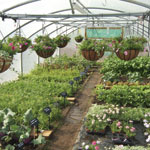Local sourcing on the internet
With consumer demand for demonstrations of local sourcing at an all-time high, operators are doing all they can to support the community. But is it possible to balance local sourcing with the benefits of online ordering? Emily Manson investigates how to order sustainably on the web
Many chefs and operators want to source locally and sustainably but don't have the resources to do the legwork. Finding artisan suppliers or local growers can be time-consuming and expensive, but as customers increasingly demand these credentials, it's becoming more important for operators to meet these expectations despite their business constraints.
The Issues
Mark Linehan, managing director of the Sustainable Restaurant Association, explains that consumers' demands for restaurateurs to offer produce sourced more sustainably has left many looking to do so but unsure how to go about it.
Historically, Linehan explains, the large procurement companies did not have a good sustainability record, but notes, "they too are changing for the better, looking at setting local hubs and providing much more information on provenance".
Simon Heppner, sustainability director of Good Business, confirms that the big suppliers have recognised it's a growing market and a trend that is here to stay. "Customers want local produce with good provenance and if they provide a mechanism to do that then it's great for everyone," he says. "It's a step in the right direction because producers at the moment suffer from a lack of access to market."
However, there is currently a big hole in the market. "Logistically it's really difficult to get the consistency and availability needed for big companies to feature artisan producers. When people order online from national suppliers they expect to be able to get as much as they want, whenever they want," Heppner adds.
No one to date, he argues, has come up with a solution to create a comprehensive online market place for this. Although there are online directories such as Henrietta Green, the Soil Association and Sustain, these fall short of being online ordering platforms.
The Big Boys
The big boys like Brakes and 3663 are addressing issues such as food miles and responsible sourcing on a company-wide level and they have also filtered this through to their ordering processes.
Their online systems enable purchasers to see the provenance of items with the area of origin detailed where possible. Clear audit trails for goods are also given along with any accreditations that might be relevant, so that operators can pick produce local to them, or Red Tractor goods, for example.
Even multinational wholesalers like Booker have embraced the need for product differentiation and it now has more than 1,000 suppliers which range from international through to local suppliers.
Keeping it flexible
Chris Durant, director of Beacon Purchasing, says that eâ€'procurement and local sourcing should not be mutually exclusive. "On the contrary, eâ€'procurement can drive compliance towards whatever deals the operator wants to put in place, be it on a national, global or local level."
There's no reason why any supplier can't be put on an online system. "E-procurement is about structuring purchasing in a more disciplined way, it's designed to make things simpler, make the whole process more robust rather than restrictive," he says.
The idea of eâ€'procurement, he stresses, should not damage the supplier-operator relationship or be prohibitive. "Online procurement doesn't stop chefs talking to local suppliers but it does provide full traceability and a proper audit trail. The whole process begins with conversations about prices and specifications and these should always continue. There's no reason your online procurement system can't have these conversations with small independent suppliers as much as national suppliers."
But while he sees eâ€'procurement as the future, he admits that a lot of truly local supplies will be directly sourced and negotiated by an operator and it wouldn't necessarily be beneficial for a third party like Beacon to become involved. However, he adds: "There's no reason why the local trout farm couldn't be put on the system once the deals are agreed, which would then provide more structure and transparency."
Suma, a cooperative wholesaler specialising in vegetarian, fairly traded, organic, ethical and natural products, was awarded the Green Supplier of the Year Award 2010-11 by the Considerate Hoteliers Association last month. It specialises in sourcing smaller regional suppliers and providing them with an avenue to get their products out nationally.
Co-operative member Emma Weston says: "Our system allows operators to source products from smaller businesses and specialist producers more easily."
Both valid approaches
But even if your buyers go direct, there's no need to reinvent the wheel. Groups like Sustain or the SRA provide online information on local suppliers and help with the procurement of ethical produce.
Charlotte Jarman, Sustain's ethical eats project officer, says that both online and going direct are valid approaches. "If you purchase online with big companies you can still look for accreditations such as organic, freedom food, MSC fish, red tractor marks," she says.
But she adds, if you go direct to the farm, you can learn more about how the animals are raised, what chemical are used and build a relationship that should then enable you to get a competitive price. It also provides a more interesting and compelling story for customers.
keeping as much in the region as possible
Battlesteads uses many local suppliers. The products used to be delivered personally or hotel staff would collect them from the producers or a local farmer's market. Now they order online and have developed a network where suppliers club together to deliver to the hotel.
Katie Meyrick, Battlestead's green officer, explains the benefits of ordering via eâ€'mail. "It saves me a lot of time and means you get fewer errors. I pick the products, get confirmation and details of when they are despatched. It's a lot easier."
The hotel's strategy is to avoid national suppliers and buy from local Newcastle-based companies where possible. "We try to keep as much in the region as we can, but for housekeeping related products, we use ethical national wholesalers like Suma. Bulk ordering brings our costs down immensely and they stock everything we need so it also saves delivery miles as well as my time and energy looking for different companies."
For products like jam and cheese, the suppliers co-ordinate deliveries, taking it in turns to bring each other's products to save on food miles. This is easily arranged via eâ€'mail and because they're local companies, they are happy to help each other. Meyrick adds: "We do a lot of things via eâ€'mail, but we still have a relationship and do still call if we need something special. For specific items we are prepared to pay a bit more as our customers appreciate the difference. We could have bog standard jam, but instead we have made a feature of it and sell the jars as an extra."
When the hotel was struggling to find a local clotted cream, Meyrick asked their cheese maker. "He now produces it just for us," she says. "It's a great selling point as we have something no one else has. It's not always just about the price."
e-procurement that embraces local suppliers
Eâ€'procurement has to provide a cross between the benefits of ease of system, efficiency and quality of information without precluding the benefits of local suppliers, according to founder and managing director, Wendy Bartlett.
She explains: "If you want a lovely local butcher or baker, there's no way they'll have the IT systems to manage full eâ€'procurement - you may have to have a much simpler version for them. We don't preclude people just because they're not fully up to speed with their systems, if it's the right product then it's one of the last considerations."
Companies need to ensure eâ€'procurement is there to help with purchasing not hinder or preclude it, she warns. "We're a foodie company first and foremost and that is reflected in the flexibility of our purchasing strategy. You have to make sure that all the systems you have in place have general flexibility to allow for lots of different ways of doing things."
However Bartlett has found bigger companies can help with other areas of the sustainability agenda. "They have data, information, controls and audit trails that local suppliers find hard to provide," she says. She cites 3663's help with the company's "Freewheeling Wednesdays" campaign - cutting deliveries on Wednesdays - to reduce the company's carbon footprint.
five key considerations for sustainable procurement
1 Think about why you really want to buy locally. Is it to support local business or cut down on food miles - one could contradict the other - for example, your local greengrocer may still get his green beans from Kenya.
2 Consider only sourcing items of local provenance locally. What is the value in diluting your purchasing volumes by buying some items from a local supplier who may not be able to deliver economies of scale across the group?
3 Ensure that local suppliers meet certain minimum standards. Are they BRC (British Retail Consortium) accredited, a safe supplier, can they demonstrate due diligence?
4 Can local suppliers ensure consistency and continuity of supply?
5 Are the local products actually local or are they just coming from a local supplier?
Source: Sustainable restaurant association












